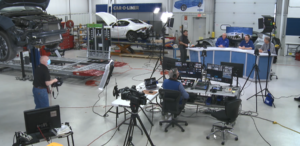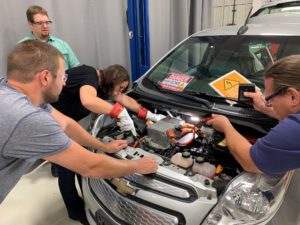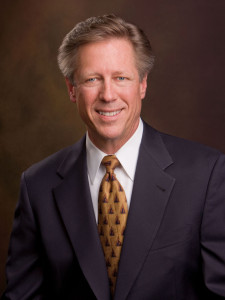
New accreditation is a ‘motivator’ for continuous improvement, I-CAR president says
By onAnnouncements | Education
After a lengthy period of rigorous self-examination, the Inter-Industry Conference on Auto Collision Repair (I-CAR) has been awarded accreditation by the International Accreditors for Continuing Education and Training (IACET).
The achievement helps to ensure “that I-CAR is doing the right things to support this industry with integrity and excellence,” the organization’s president, John Van Alstyne, told Repairer Driven News.
IACET’s mission is “to promote and enhance quality in continuing education and training through research, education, and the development and continuous improvement of IACET criteria, principles, and standards.”
Van Alstyne said achieving and maintaining IACET accreditation will serve the thousands of technicians who receive training through I-CAR’s programming each year, whether that’s through online classes, in-shop instruction, or live classroom training, which is currently dormant because of COVID restrictions.
He said the organization has already made improvements, thanks to the internal examination that IACET prompted.
“As we went through the process over the past couple of years, we identified gaps that we flagged, and then we applied our continuous improvement methodologies to close those gaps, update our processes and SOPs. And we identified some opportunities,” Van Alstyne said.
“We have a quality team here at I-CAR. We have a process improvement function. And those folks are the ones that worked with our curriculum and delivery teams and our product management teams to do internal audits, process review audits, identifying gaps, and choreographing the closure of those gaps,” he said.
“We did all that work ourselves and identified those opportunities ourselves. And then, once we felt we were in a position of confidence, we applied for the external audit, which then resulted in our accreditation – and we achieved that on the first pass,” he said.
The IACET accreditation, the first for an organization in the collision inter-industry, is an outgrowth of a commitment I-CAR made in the first quarter of 2020 to “continuous improvement … this was an accreditation we aspired to earn,” Van Alstyne said.
“We looked at it as a kind of a motivator for us, to make sure that we strive toward that level of excellence and that we work to maintain that going forward,” he said. “What that really means to our collision industry partners [is] that they can rely on us as being a credible, world-class organization.”
Asked whether I-CAR’s accreditation might help address the industry’s worker shortage, Van Alstyne replied that it would “enhance the image of the collision repair industry, which would work to the benefit of attraction and retention” in an indirect way.
“That said, our programming is designed to improve talent,” he added. “So there’s opportunities for folks to come into this industry and develop their competencies through our educational programming [to become] very productive, well-compensated technicians. From a retention perspective, if you are a well-performing technician, your odds of being retained by your employer are great. I think it does contribute that way,” he said.
“Now, I think there’s other dynamics that are going on into the whole talent equation. As an industry, are we able to attract the level of talent that we need to replace aging-out workers, expansion of the capabilities, the resources that we need within the industry?” he added. “I-CAR is looking at how we can help in that regard. I’m not ready to announce any formal initiatives quite yet, but we are looking at how I-CAR could help there.”
Other aspects, such as additional compensation to match the higher level of training, are up to individual shops, Van Alstyne said.
“Are the shops doing the right things in terms of their culture and their management behavior that would encourage technicians to stay with the shop? Technician turnover is a big issue in this industry,” he said. “If you’re constantly cycling through new people, and not retaining your people, that’s not necessarily a good business strategy. So we’re trying to encourage shops to pick up their management game, to do a better job all on their own on retaining their talent.”
Technician compensation, he added, is “not part of our schtick, if you will. That’s kind of up to the shops. But certainly, a more experienced skilled technician has more value, and I think shops would be well advised to consider that. Folks that are well trained, and have those credentials are certainly in demand, I would say.”
 For I-CAR, the costs of achieving and maintaining accreditation are “considered the cost of doing business, and doing business in the right way. We’ve made those commitments. I-CAR is not a small organization by any means. I think we’ve built the scale, we have the right expertise. We have the right people to do this work and we’ve staffed ourselves appropriately to be able to execute with consistency.”
For I-CAR, the costs of achieving and maintaining accreditation are “considered the cost of doing business, and doing business in the right way. We’ve made those commitments. I-CAR is not a small organization by any means. I think we’ve built the scale, we have the right expertise. We have the right people to do this work and we’ve staffed ourselves appropriately to be able to execute with consistency.”
Just under 9,000 shops have achieved I-CAR’s Gold Class standing, Van Alstyne said. “We have 76,534 unique students trained with I-CAR, which I think is larger than any university in the United States,” he added.
He said the number of Gold Class shops has more than tripled since the end of 2012, which he attributes to three factors: I-CAR’s ongoing improvement, collaboration with OEMs and insurers, and the “technical tsunami” that continues to add to the complexity of collision repair.
“Requirements of repairing cars have escalated significantly over the past decade. We’ve been trying to be proactive with the industry to help them understand that for the past 10 years, and it’s I would say that not only is it coming, it’s here, and we’re actually surfing on that wave right now,” Van Alstyne said.
“If you don’t have a commitment to the right facilities, the right equipment, the right processes, the right technical competencies in terms of repair planning, and actually doing the work, it’s gonna be a real challenge. And quite frankly, I think training is one of those components that dictates survival and the ability to thrive in this environment.”
More information
I-CAR’s homepage
IACET’s homepage
I-CAR Appleton tech center to be revamped, Chicago center on tap to open soon
Images
Featured image: Technicians record a training video in I-CAR’s Appleton, Wisconsin technical center. (Provided by I-CAR)
I-CAR technicians record an EV training class. (Provided by I-CAR)


